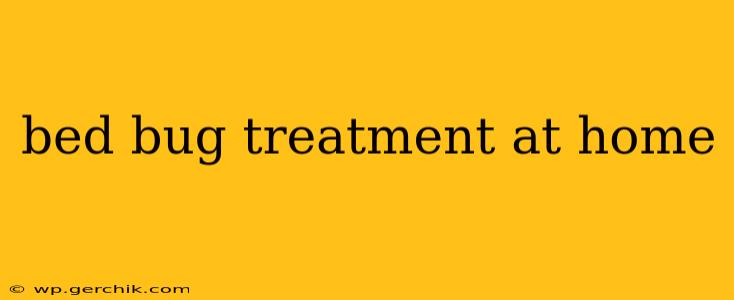Bed bugs. Just the word sends shivers down many spines. These tiny, nocturnal insects are notorious for their itchy bites and persistent infestations. While professional pest control is often the most effective solution, there are several home treatments you can employ to combat bed bugs and regain control of your living space. This guide explores effective strategies, offering a comprehensive approach to tackling this common household pest.
What are the most effective home remedies for bed bugs?
Several home remedies show promise in controlling bed bug infestations, though none offer a complete eradication guarantee. Combining methods is key. These include:
-
Heat Treatment: High temperatures are lethal to bed bugs. Using a hair dryer on affected areas, washing clothes and bedding in hot water (at least 120°F), and even strategically placing infested items in a sealed car on a hot day can help kill bed bugs and their eggs. Remember safety precautions when using heat – avoid fire hazards and burns.
-
Steam Cleaning: A steam cleaner can effectively kill bed bugs on mattresses, furniture, and other surfaces. The high-temperature steam penetrates fabric and crevices, eliminating both adult bugs and eggs. Be sure to thoroughly clean all seams and cracks.
-
Diatomaceous Earth (DE): This naturally occurring, non-toxic powder is abrasive to bed bugs' exoskeletons, causing dehydration and death. Sprinkle DE in cracks and crevices where bed bugs hide, such as mattress seams, baseboards, and along floorboards. Note: Use food-grade DE for safety.
-
Vacuuming: Regular, thorough vacuuming is crucial in removing bed bugs and their eggs from carpets, upholstery, and other surfaces. Dispose of the vacuum bag immediately after use in an outdoor trash can.
How can I prevent bed bugs from returning after treatment?
Preventing a resurgence is as important as initial treatment. These preventative measures are vital:
-
Encase your mattress and box spring: Protective encasements create a barrier, preventing bed bugs from accessing your mattress and breeding. Choose encasements specifically designed for bed bug prevention.
-
Regularly inspect your home: Check your mattress, bedding, furniture, and cracks and crevices regularly for signs of bed bugs (e.g., small dark spots, shed skins, live bugs). Early detection is key.
-
Reduce clutter: Bed bugs thrive in cluttered environments. Maintaining a clean and organized home reduces their hiding places.
-
Wash and dry all bedding frequently: High heat kills bed bugs and eggs, so washing bedding in hot water and drying on high heat is crucial.
What are some natural ways to kill bed bugs?
Several natural substances have shown insecticidal properties against bed bugs, though their effectiveness may vary and they're often best used in conjunction with other methods:
-
Essential oils: Certain essential oils, such as tea tree oil, peppermint oil, and lavender oil, are thought to repel or kill bed bugs, but their effect isn't consistently strong. Dilute essential oils before applying them to surfaces, and always test in an inconspicuous area first to avoid staining.
-
Neem oil: Derived from the neem tree, this oil has insecticidal properties and can be used to repel bed bugs. Similar to essential oils, it’s often best used in combination with other methods.
Are there any home remedies that don't work for bed bugs?
While many home remedies are touted, some are largely ineffective against bed bugs:
-
Baking soda: Baking soda's effectiveness against bed bugs is minimal. While it can absorb odors, it doesn't effectively kill the insects.
-
Vinegar: Although vinegar can be used as a cleaning agent, its insecticidal properties against bed bugs are negligible.
When should I call a professional pest control service for bed bugs?
If home treatments prove ineffective or the infestation is severe, it's crucial to contact a professional pest control service. Professionals have access to more potent insecticides and effective treatment strategies that can eliminate a bed bug infestation completely. Signs you need professional help include a large infestation, spreading of the infestation despite your efforts, or recurring issues.
Remember, consistent diligence and a multifaceted approach are crucial in successfully managing a bed bug infestation. While home remedies can be helpful in supplementing professional treatment or managing small infestations, professional assistance often proves necessary for complete eradication. Always prioritize safety when using any treatment method.
